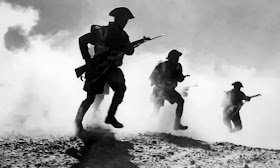War poetry is poetry on the topic of war. While the term is applied especially to works of the First World War. This blog is a thinking activity based on that, assigned by Vaidehi ma’am. For further information, you can check out her blog here - War Poetry.
1. Difference of all the war poets.
The war poets that we encountered in this unit are: Rupert Brooke, Wilfred Owen, Siegfried Sassoon, Wilfrid Wilson Gibson and Ivor Gurney. All of them possess a unique poetic style. They have different view on war and the focus of their poetry also differ from each other. To analyse these differences you can study the chart given below:-
Rupert Brooke glorified and portrayed war in a patriotic light, using traditional forms like sonnets to highlight heroism and sacrifice. In contrast, Wilfred Owen took a deeply critical and disillusioned stance, employing free verse, vivid imagery, and metaphors to depict the individual soldier's harrowing experiences and psychological/physical wounds.
Siegfried Sassoon initially embraced patriotism but later became critical and satirical, using a bitter, ironic tone and dark humor to disillusion official narratives and critique the glorification of war and its leadership.
Wilfrid Wilson Gibson focused on the human cost and social impact of war on communities, using realistic depictions and simple language to convey loss and grief.
Ivor Gurney's poetry was a personal journey exploring mental health struggles, with an introspective, lyrical style seeking meaning amidst the trauma.
In short, while Brooke romanticised war heroically, Owen, Sassoon, Gibson, and Gurney offered contrasting, critical perspectives through their distinct poetic voices and styles, highlighting the harsh realities, psychological tolls, and disillusionment with the glorification of conflict.
2. Comparing Rupert Brooke’s “The Soldier” and Wilfred Owen’s “Anthem For Doomed Youth”.
You can check out both of these poems here-
Subject:-
‘The Soldier’ reflects a romanticised view of war, presenting the death of a soldier as a glorious sacrifice for the homeland. Through this poem, Rupert Brooke portrays a sense of patriotism and nationalism, showcasing the soldier's connection to England as something eternal.
Wilfred Owen's poem, ‘Anthem for Doomed Youth’ in contrast, provides a stark portrayal of the harsh realities of war, focusing on the tragic and senseless loss of young lives. The subject matter of this poem emphasises the destructive impact of war on the youth, questioning the conventional notions of sacrifice.
Style of Writing:-
Rupert Brooke uses traditional poetic forms as he makes use of sonnet structure and a lyrical style. The language is flowery creating an atmosphere of beauty even when it is used in the context of war.
Wilfred Owen's style, on the other hand, is more modern. He uses vivid and often harsh imagery to depict the brutal nature of war. The poem is structured like a sonnet but differs from traditional sonnet themes, creating a lack of harmony that reflects the disquieting subject matter.
Patriotism:-
‘The Soldier’ displays a strong sense of patriotism, celebrating the soldier's role in serving the nation. The idea of patriotism in this poem is more traditional and positive, aligning with the idea of sacrifice for a greater cause.
Owen, however, challenges conventional notions of patriotism by portraying the grim reality of war and questioning the true value of sacrificing young lives. The poem's critical tone suggests a reevaluation of the traditional patriotic sentiments associated with war.
So while Brooke's "The Soldier" romanticizes war and emphasizes patriotic sacrifice, Owen's "Anthem for Doomed Youth" offers a contrasting perspective that critiques the brutality and futility of war, challenging traditional notions of heroism and patriotism.
3. Do you find any such regional poem/movies/web series/songs which can be compared to any one of the poems given here. Also, give a proper explanation of the similarity.
One Hindi song that I would like to compare with “The Soldier” by Rupert Brooke is “Desh Mere”, from the movie “Bhuj: The Pride of India”. The song is sung by Arijit Singh and written by Manoj Muntashir. You can check out the song here -
The reason for this comparison is that both these songs present an idealistic sense of honour that is present in the soldiers. These lines from the song best describes the idea that the soldier feels devoted to nation and would readily die for its sake.
है अर्ज़ ये दीवाने की, जहाँ भोर सुहानी देखी,
एक रोज़ वहीं मेरी शाम हो
The same sentiments are seen in these lines from the poem -
“In that rich earth a richer dust concealed;
A dust whom England bore, shaped, made aware,
Gave, once, her flowers to love, her ways to roam;
A body of England’s, breathing English air,
Washed by the rivers, blest by suns of home.”
The poet too presents the perspective where the soldier would die happily for his motherland.
In this manner, both these songs presents a similar mindset of the soldiers who would sacrifice anything for their nation.
Words- 900
Images- 5
Videos-3





Comments
Post a Comment